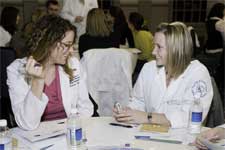
KINGSTON, R.I.— December 3, 2008 –- If you hadn’t noticed the white lab coats and the identification badges, you might have thought you were at a giant game show.
Hosts were equipped with microphones, and they spun a large wheel to determine which group would answer questions from a variety of case studies. When brave participants volunteered to respond on the spot for their groups, there were smiles and laughter among the crowd.
The good humor and collaborative tone of the exercise at Brown University’s Andrews Hall made it that much easier for University of Rhode Island pharmacy and nursing students and students of The Warren Alpert Medical School of Brown University to test their ability to respond in a matter of minutes to issues related to asthma and chronic obstructive pulmonary disease, which is frequently caused by smoking and other environmental triggers. The primary goal of the required exercise was to foster inter-professional collaboration.

During two nights in late November, 100 students from URI’s College of Pharmacy, 80 students from URI’s College of Nursing and 96 students from the Alpert Medical School worked together to combat communication lapses that can lead to medical errors.
The recent workshop followed an initiative begun two years ago by the URI Colleges of Pharmacy and Nursing to bring their students together to share information from their different professional perspectives on caring for patients with diabetes. The nursing students learned about advances in pharmaceutical treatments, and the pharmacists learned how to give insulin injections and about care at the bedside.
“This year, with the cooperation of the Alpert Medical School, we took our show on the road,” said Celia MacDonnell, URI clinical associate professor of pharmacy and coordinator of the workshop at Brown. “This was a required part of the coursework for all three groups. While it was run in a dynamic and interactive fashion, the program focused on serious issues relating to enhanced communication among health care professionals with the ultimate goal of improving patient care. Our goal is to embed such inter-professional education in our programs so we graduate nurses, pharmacists and doctors who are conversant with professionals in each discipline.”

“You can see the students’ are interacting beautifully on these cases,” said Dr. Luba Dumenco, co-director of the preclinical curriculum and a lecturer in pathology and laboratory medicine at the Alpert Medical School. “We were eager to participate with this project. When I got the email from Celia, I thought it would be great to be involved because we know medical errors are a problem. The way to decrease medical errors is to improve communication among the health care team. I am thrilled with how this is going.”
Mary Lavin, clinical associate professor of nursing at URI, said each case study was designed to involve all students in developing the responses. Each team included pharmacy, nursing and medical students to ensure that the program was fully collaborative.
“It’s a great opportunity for our nursing students because they don’t get to work frequently with other health care professional students such as pharmacy students and medical students,” Lavin said. “We are studying whether such programs lead to an attitude change among the participants so they are able to appreciate the professional roles that other health care professionals play. We hope that wherever they go, there is a great appreciation for what other professionals can offer.”
URI pharmacy student Christine Eisenhower of Schenectady, N.Y. said, “The exercise was a good way to encourage coordination among health care professionals because we can all offer something. We learn from each other.”
“It’s very valuable because we are all working together, nurses, doctors and pharmacists, to prevent errors,” said Brown medical student Wilbur Allen.
Sarah Cohen, a URI junior nursing major from Fanwood, N.J., agreed saying such cooperative programs should be done more often. “We need to learn to communicate with different professionals,” she said.

“Once you are in a hospital there is an unspoken sense of hierarchy,” said Carleyna Nunes, a Brown medical student. “This is one of the best ways to combat it. You have to trust who you are working with. If you have faith in your team, patient care improves.”
Fellow medical student Bharati Kalasapudi said she enjoyed meeting the pharmacy and nursing students. “We are learning from each other’s specialties, and it is fun,” she said.
Jason Buckley, a URI nursing student from West Kingston, added that the workshop was an important multidisciplinary exercise in managing asthma. “We have great students at our table. They are very knowledgeable in their respective fields.”
Media Contact: Dave Lavallee, 401-874-5862

